Detailed Analysis of Agency and Partnership Law with Case Studies
VerifiedAdded on 2020/01/28
|8
|2003
|45
Homework Assignment
AI Summary
This law assignment solution provides a detailed analysis of agency and partnership law through the examination of two distinct case studies. The first case explores the concept of apparent authority, where an agent exceeds their actual authority but binds the principal due to the third party's reasonable belief in the agent's authority. It analyzes issues related to an agent acting on behalf of a principal and the principal's obligations. The second case delves into partnership law, focusing on the powers of partners to bind the firm. It addresses issues concerning a partner's actions, such as purchasing assets and entering new business ventures. The assignment references relevant legal provisions, including the Partnership Act 1892 (Cth), and judicial pronouncements, such as Royal British Bank v. Turquand and Mercantile Credit Ltd. v. Garrod, to support its arguments. It also examines the duty of fidelity of employees and the scope of partner's authority within a firm. The solution provides clear applications of legal principles to the facts of each case, culminating in concise conclusions that address the legal issues presented.
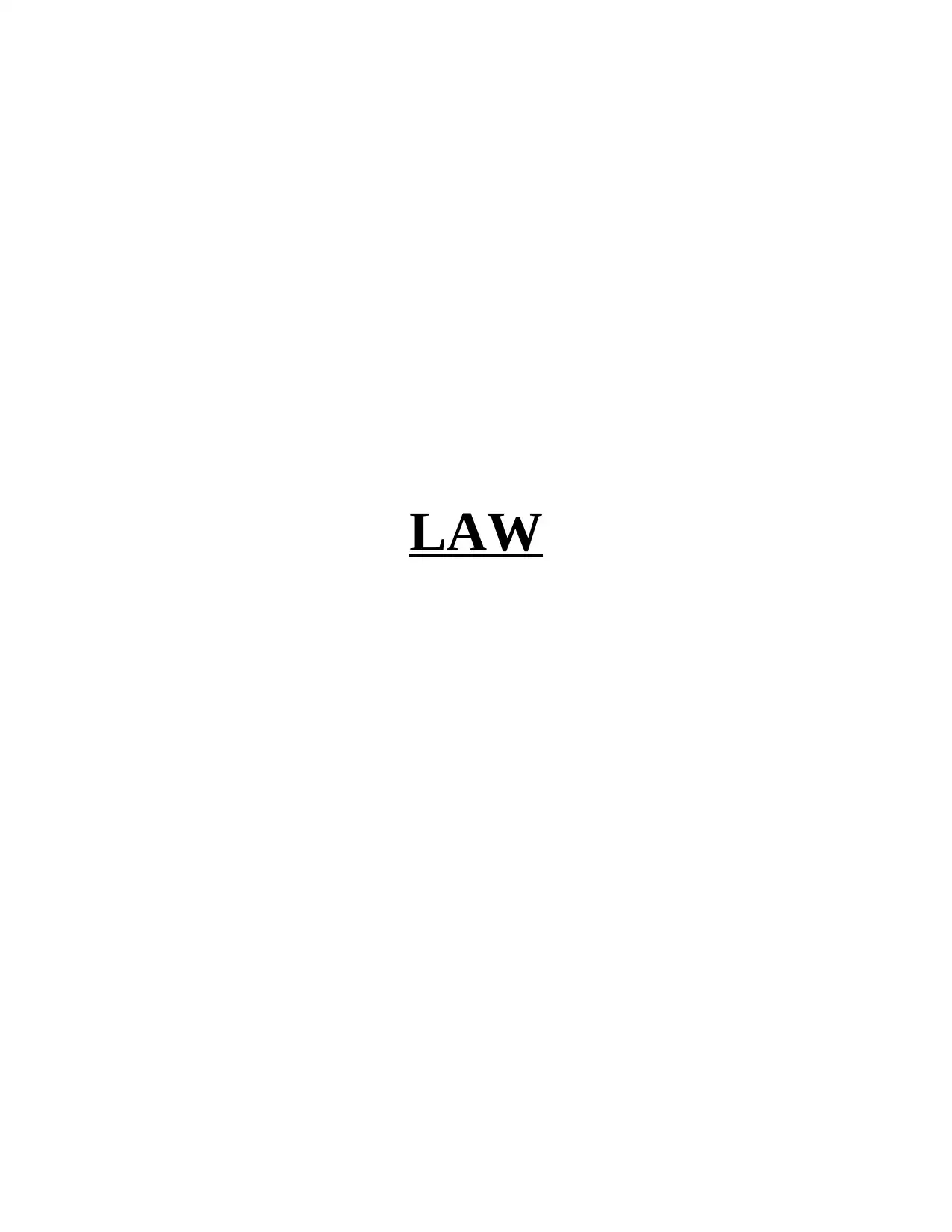
LAW
Paraphrase This Document
Need a fresh take? Get an instant paraphrase of this document with our AI Paraphraser
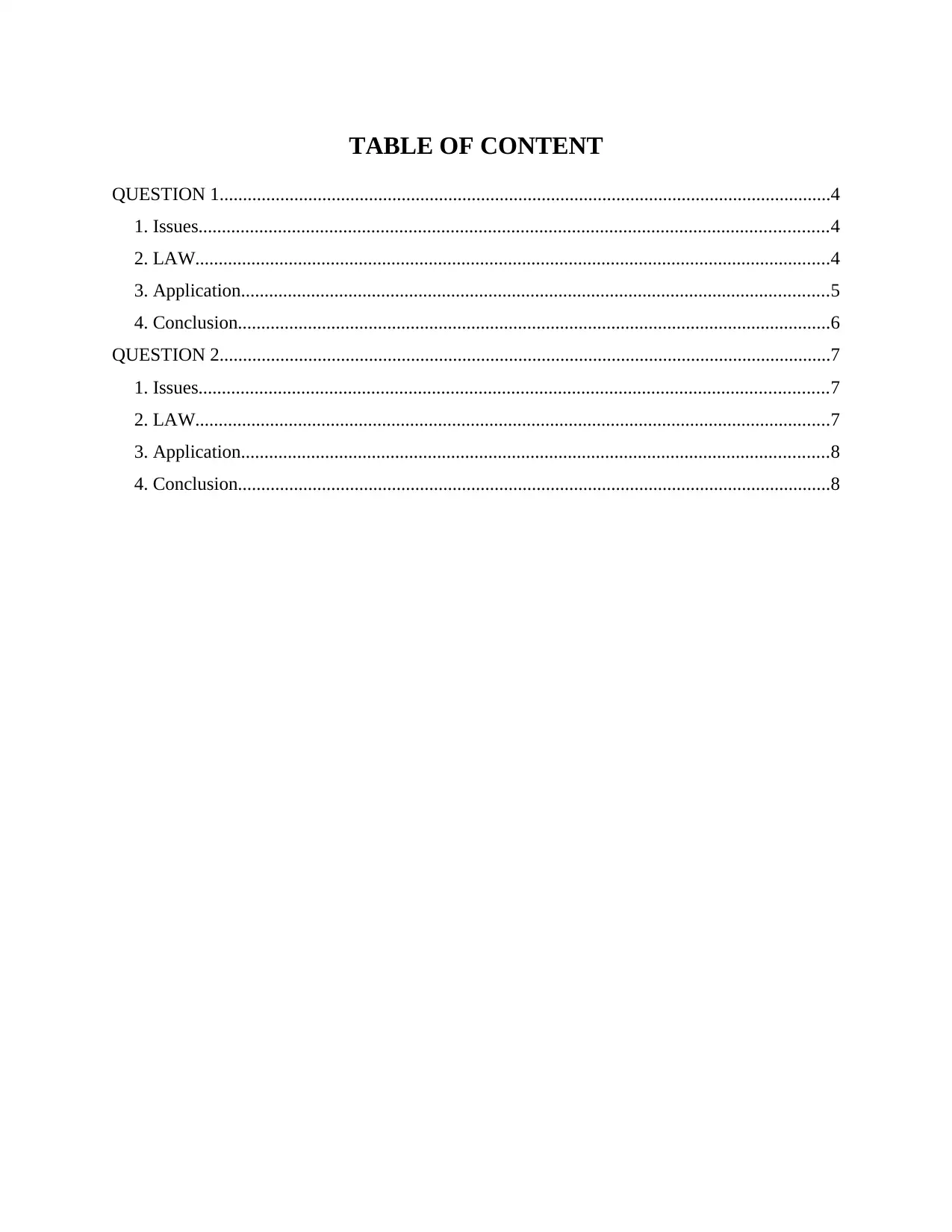
TABLE OF CONTENT
QUESTION 1...................................................................................................................................4
1. Issues.......................................................................................................................................4
2. LAW........................................................................................................................................4
3. Application..............................................................................................................................5
4. Conclusion...............................................................................................................................6
QUESTION 2...................................................................................................................................7
1. Issues.......................................................................................................................................7
2. LAW........................................................................................................................................7
3. Application..............................................................................................................................8
4. Conclusion...............................................................................................................................8
QUESTION 1...................................................................................................................................4
1. Issues.......................................................................................................................................4
2. LAW........................................................................................................................................4
3. Application..............................................................................................................................5
4. Conclusion...............................................................................................................................6
QUESTION 2...................................................................................................................................7
1. Issues.......................................................................................................................................7
2. LAW........................................................................................................................................7
3. Application..............................................................................................................................8
4. Conclusion...............................................................................................................................8

⊘ This is a preview!⊘
Do you want full access?
Subscribe today to unlock all pages.

Trusted by 1+ million students worldwide
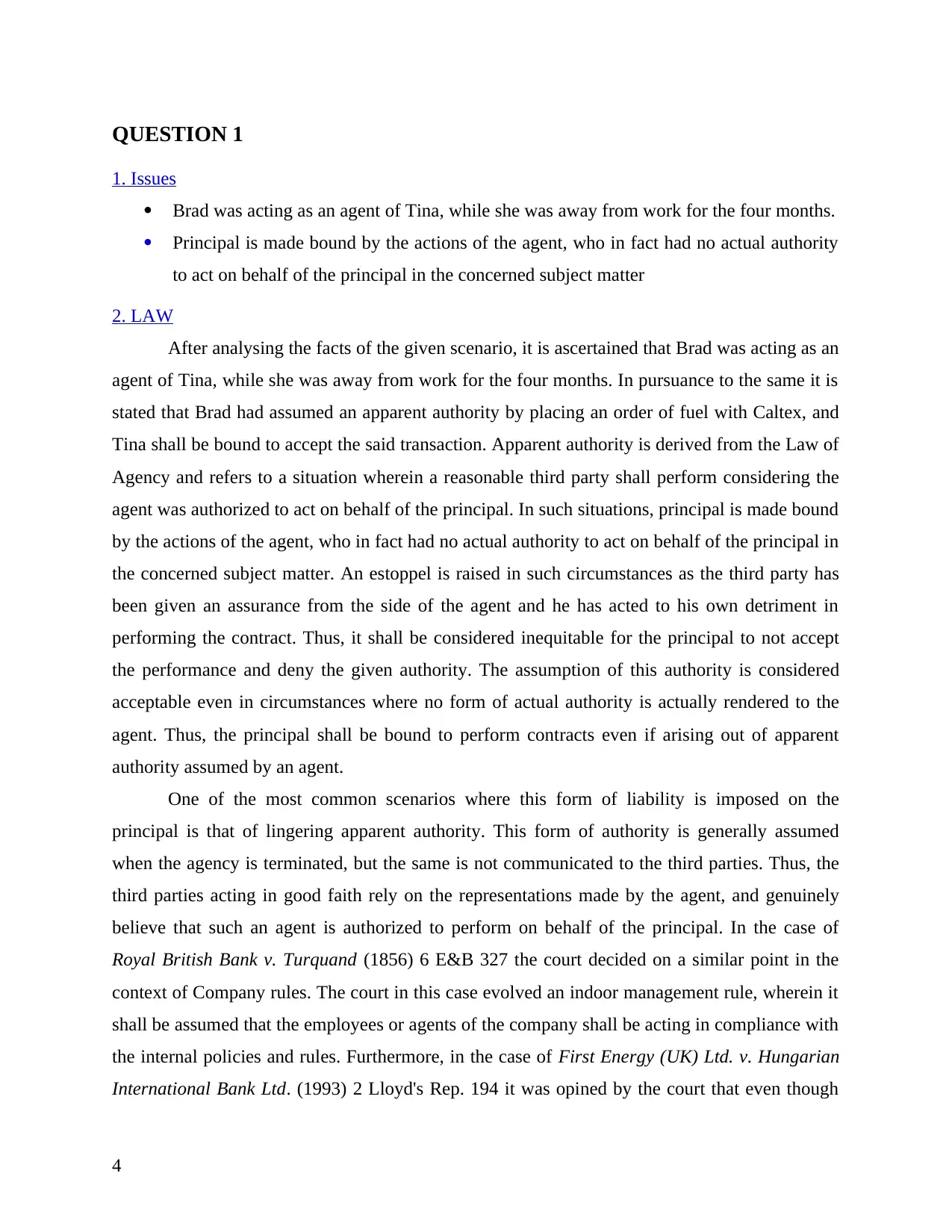
QUESTION 1
1. Issues
Brad was acting as an agent of Tina, while she was away from work for the four months.
Principal is made bound by the actions of the agent, who in fact had no actual authority
to act on behalf of the principal in the concerned subject matter
2. LAW
After analysing the facts of the given scenario, it is ascertained that Brad was acting as an
agent of Tina, while she was away from work for the four months. In pursuance to the same it is
stated that Brad had assumed an apparent authority by placing an order of fuel with Caltex, and
Tina shall be bound to accept the said transaction. Apparent authority is derived from the Law of
Agency and refers to a situation wherein a reasonable third party shall perform considering the
agent was authorized to act on behalf of the principal. In such situations, principal is made bound
by the actions of the agent, who in fact had no actual authority to act on behalf of the principal in
the concerned subject matter. An estoppel is raised in such circumstances as the third party has
been given an assurance from the side of the agent and he has acted to his own detriment in
performing the contract. Thus, it shall be considered inequitable for the principal to not accept
the performance and deny the given authority. The assumption of this authority is considered
acceptable even in circumstances where no form of actual authority is actually rendered to the
agent. Thus, the principal shall be bound to perform contracts even if arising out of apparent
authority assumed by an agent.
One of the most common scenarios where this form of liability is imposed on the
principal is that of lingering apparent authority. This form of authority is generally assumed
when the agency is terminated, but the same is not communicated to the third parties. Thus, the
third parties acting in good faith rely on the representations made by the agent, and genuinely
believe that such an agent is authorized to perform on behalf of the principal. In the case of
Royal British Bank v. Turquand (1856) 6 E&B 327 the court decided on a similar point in the
context of Company rules. The court in this case evolved an indoor management rule, wherein it
shall be assumed that the employees or agents of the company shall be acting in compliance with
the internal policies and rules. Furthermore, in the case of First Energy (UK) Ltd. v. Hungarian
International Bank Ltd. (1993) 2 Lloyd's Rep. 194 it was opined by the court that even though
4
1. Issues
Brad was acting as an agent of Tina, while she was away from work for the four months.
Principal is made bound by the actions of the agent, who in fact had no actual authority
to act on behalf of the principal in the concerned subject matter
2. LAW
After analysing the facts of the given scenario, it is ascertained that Brad was acting as an
agent of Tina, while she was away from work for the four months. In pursuance to the same it is
stated that Brad had assumed an apparent authority by placing an order of fuel with Caltex, and
Tina shall be bound to accept the said transaction. Apparent authority is derived from the Law of
Agency and refers to a situation wherein a reasonable third party shall perform considering the
agent was authorized to act on behalf of the principal. In such situations, principal is made bound
by the actions of the agent, who in fact had no actual authority to act on behalf of the principal in
the concerned subject matter. An estoppel is raised in such circumstances as the third party has
been given an assurance from the side of the agent and he has acted to his own detriment in
performing the contract. Thus, it shall be considered inequitable for the principal to not accept
the performance and deny the given authority. The assumption of this authority is considered
acceptable even in circumstances where no form of actual authority is actually rendered to the
agent. Thus, the principal shall be bound to perform contracts even if arising out of apparent
authority assumed by an agent.
One of the most common scenarios where this form of liability is imposed on the
principal is that of lingering apparent authority. This form of authority is generally assumed
when the agency is terminated, but the same is not communicated to the third parties. Thus, the
third parties acting in good faith rely on the representations made by the agent, and genuinely
believe that such an agent is authorized to perform on behalf of the principal. In the case of
Royal British Bank v. Turquand (1856) 6 E&B 327 the court decided on a similar point in the
context of Company rules. The court in this case evolved an indoor management rule, wherein it
shall be assumed that the employees or agents of the company shall be acting in compliance with
the internal policies and rules. Furthermore, in the case of First Energy (UK) Ltd. v. Hungarian
International Bank Ltd. (1993) 2 Lloyd's Rep. 194 it was opined by the court that even though
4
Paraphrase This Document
Need a fresh take? Get an instant paraphrase of this document with our AI Paraphraser
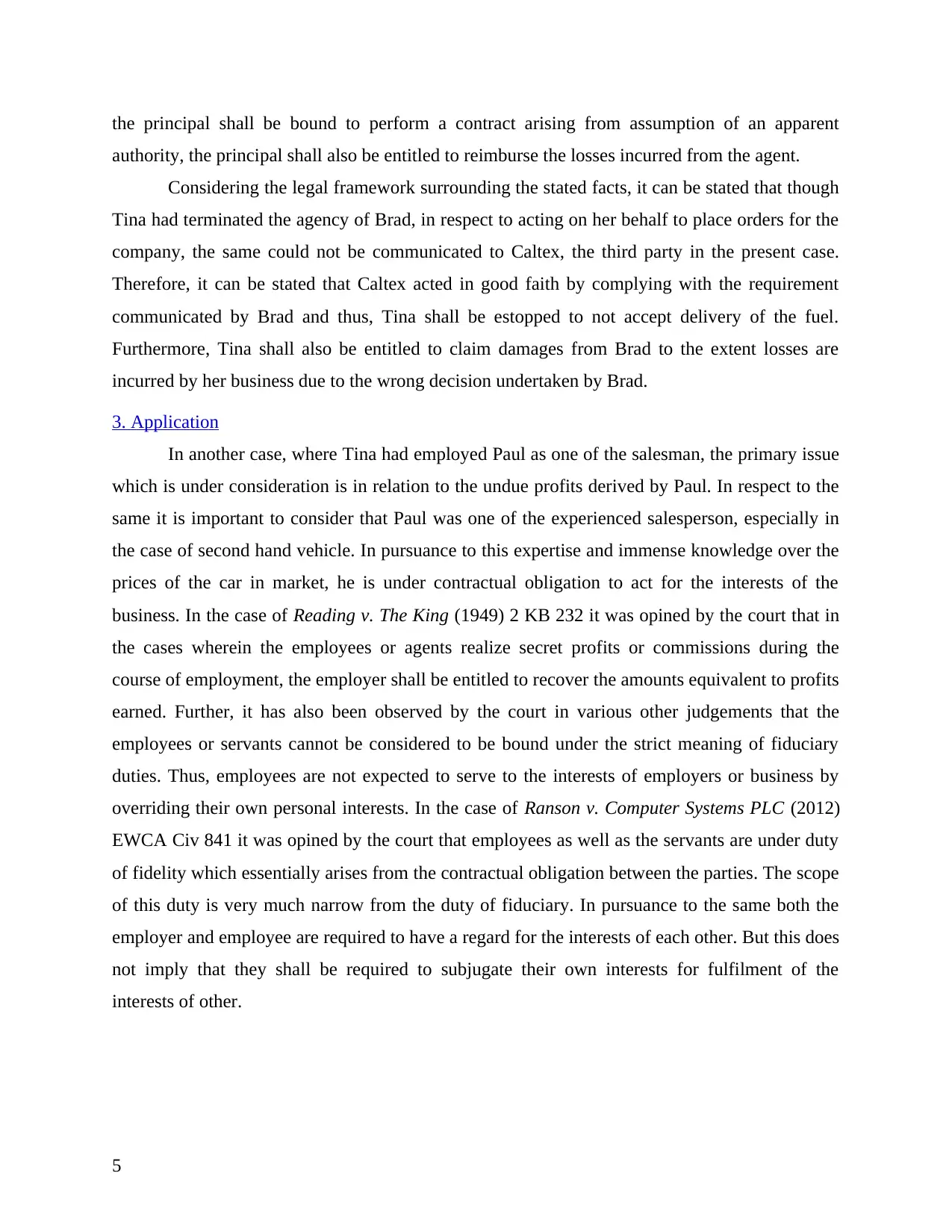
the principal shall be bound to perform a contract arising from assumption of an apparent
authority, the principal shall also be entitled to reimburse the losses incurred from the agent.
Considering the legal framework surrounding the stated facts, it can be stated that though
Tina had terminated the agency of Brad, in respect to acting on her behalf to place orders for the
company, the same could not be communicated to Caltex, the third party in the present case.
Therefore, it can be stated that Caltex acted in good faith by complying with the requirement
communicated by Brad and thus, Tina shall be estopped to not accept delivery of the fuel.
Furthermore, Tina shall also be entitled to claim damages from Brad to the extent losses are
incurred by her business due to the wrong decision undertaken by Brad.
3. Application
In another case, where Tina had employed Paul as one of the salesman, the primary issue
which is under consideration is in relation to the undue profits derived by Paul. In respect to the
same it is important to consider that Paul was one of the experienced salesperson, especially in
the case of second hand vehicle. In pursuance to this expertise and immense knowledge over the
prices of the car in market, he is under contractual obligation to act for the interests of the
business. In the case of Reading v. The King (1949) 2 KB 232 it was opined by the court that in
the cases wherein the employees or agents realize secret profits or commissions during the
course of employment, the employer shall be entitled to recover the amounts equivalent to profits
earned. Further, it has also been observed by the court in various other judgements that the
employees or servants cannot be considered to be bound under the strict meaning of fiduciary
duties. Thus, employees are not expected to serve to the interests of employers or business by
overriding their own personal interests. In the case of Ranson v. Computer Systems PLC (2012)
EWCA Civ 841 it was opined by the court that employees as well as the servants are under duty
of fidelity which essentially arises from the contractual obligation between the parties. The scope
of this duty is very much narrow from the duty of fiduciary. In pursuance to the same both the
employer and employee are required to have a regard for the interests of each other. But this does
not imply that they shall be required to subjugate their own interests for fulfilment of the
interests of other.
5
authority, the principal shall also be entitled to reimburse the losses incurred from the agent.
Considering the legal framework surrounding the stated facts, it can be stated that though
Tina had terminated the agency of Brad, in respect to acting on her behalf to place orders for the
company, the same could not be communicated to Caltex, the third party in the present case.
Therefore, it can be stated that Caltex acted in good faith by complying with the requirement
communicated by Brad and thus, Tina shall be estopped to not accept delivery of the fuel.
Furthermore, Tina shall also be entitled to claim damages from Brad to the extent losses are
incurred by her business due to the wrong decision undertaken by Brad.
3. Application
In another case, where Tina had employed Paul as one of the salesman, the primary issue
which is under consideration is in relation to the undue profits derived by Paul. In respect to the
same it is important to consider that Paul was one of the experienced salesperson, especially in
the case of second hand vehicle. In pursuance to this expertise and immense knowledge over the
prices of the car in market, he is under contractual obligation to act for the interests of the
business. In the case of Reading v. The King (1949) 2 KB 232 it was opined by the court that in
the cases wherein the employees or agents realize secret profits or commissions during the
course of employment, the employer shall be entitled to recover the amounts equivalent to profits
earned. Further, it has also been observed by the court in various other judgements that the
employees or servants cannot be considered to be bound under the strict meaning of fiduciary
duties. Thus, employees are not expected to serve to the interests of employers or business by
overriding their own personal interests. In the case of Ranson v. Computer Systems PLC (2012)
EWCA Civ 841 it was opined by the court that employees as well as the servants are under duty
of fidelity which essentially arises from the contractual obligation between the parties. The scope
of this duty is very much narrow from the duty of fiduciary. In pursuance to the same both the
employer and employee are required to have a regard for the interests of each other. But this does
not imply that they shall be required to subjugate their own interests for fulfilment of the
interests of other.
5
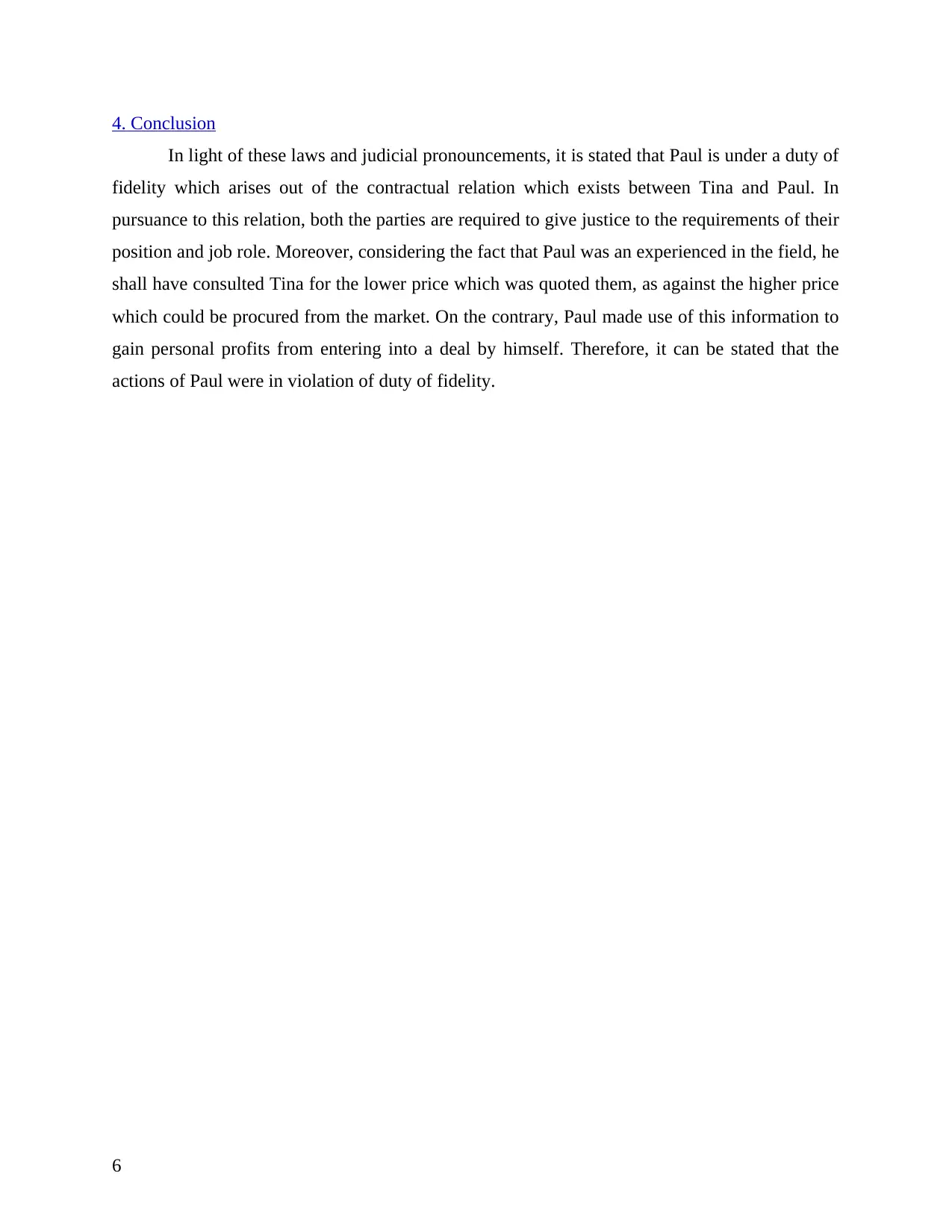
4. Conclusion
In light of these laws and judicial pronouncements, it is stated that Paul is under a duty of
fidelity which arises out of the contractual relation which exists between Tina and Paul. In
pursuance to this relation, both the parties are required to give justice to the requirements of their
position and job role. Moreover, considering the fact that Paul was an experienced in the field, he
shall have consulted Tina for the lower price which was quoted them, as against the higher price
which could be procured from the market. On the contrary, Paul made use of this information to
gain personal profits from entering into a deal by himself. Therefore, it can be stated that the
actions of Paul were in violation of duty of fidelity.
6
In light of these laws and judicial pronouncements, it is stated that Paul is under a duty of
fidelity which arises out of the contractual relation which exists between Tina and Paul. In
pursuance to this relation, both the parties are required to give justice to the requirements of their
position and job role. Moreover, considering the fact that Paul was an experienced in the field, he
shall have consulted Tina for the lower price which was quoted them, as against the higher price
which could be procured from the market. On the contrary, Paul made use of this information to
gain personal profits from entering into a deal by himself. Therefore, it can be stated that the
actions of Paul were in violation of duty of fidelity.
6
⊘ This is a preview!⊘
Do you want full access?
Subscribe today to unlock all pages.

Trusted by 1+ million students worldwide
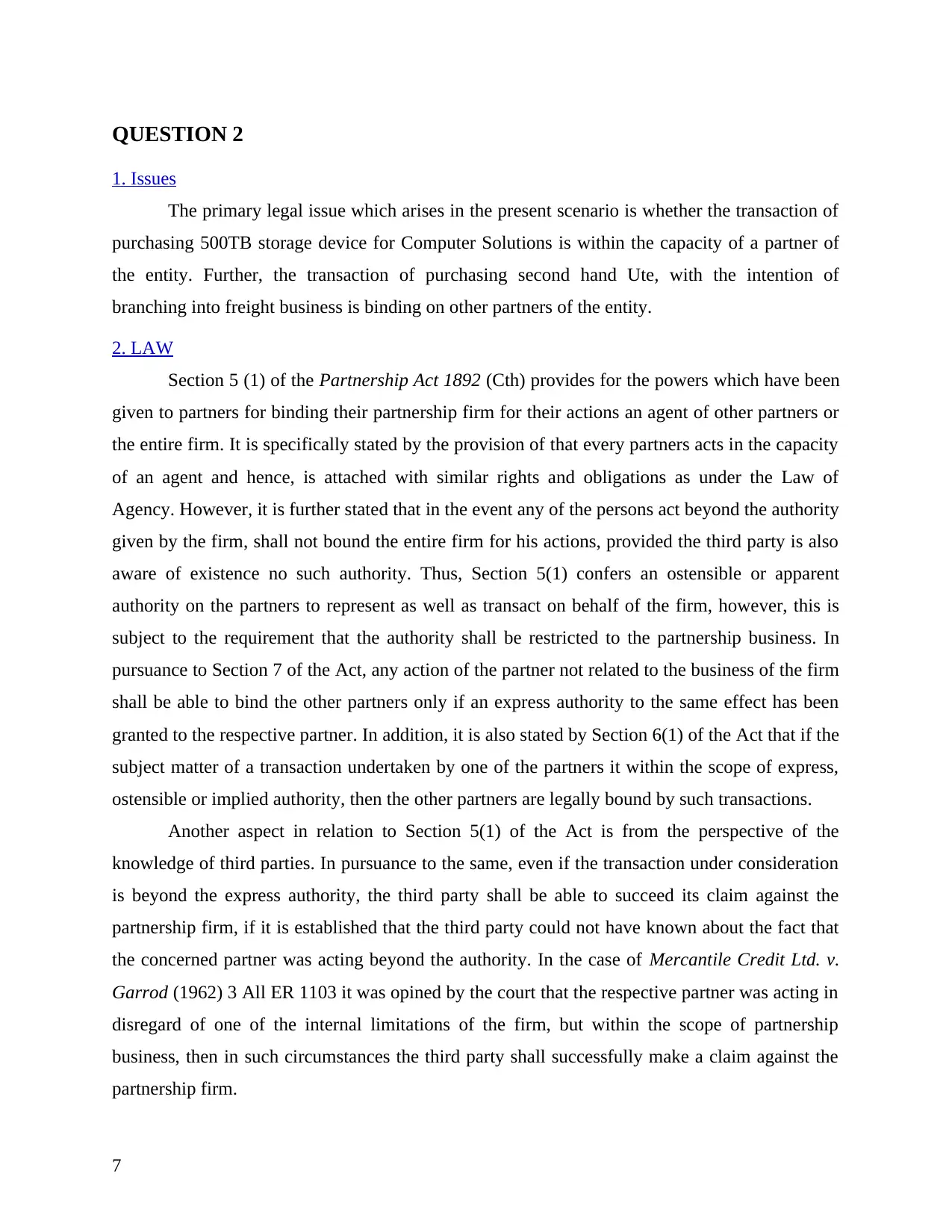
QUESTION 2
1. Issues
The primary legal issue which arises in the present scenario is whether the transaction of
purchasing 500TB storage device for Computer Solutions is within the capacity of a partner of
the entity. Further, the transaction of purchasing second hand Ute, with the intention of
branching into freight business is binding on other partners of the entity.
2. LAW
Section 5 (1) of the Partnership Act 1892 (Cth) provides for the powers which have been
given to partners for binding their partnership firm for their actions an agent of other partners or
the entire firm. It is specifically stated by the provision of that every partners acts in the capacity
of an agent and hence, is attached with similar rights and obligations as under the Law of
Agency. However, it is further stated that in the event any of the persons act beyond the authority
given by the firm, shall not bound the entire firm for his actions, provided the third party is also
aware of existence no such authority. Thus, Section 5(1) confers an ostensible or apparent
authority on the partners to represent as well as transact on behalf of the firm, however, this is
subject to the requirement that the authority shall be restricted to the partnership business. In
pursuance to Section 7 of the Act, any action of the partner not related to the business of the firm
shall be able to bind the other partners only if an express authority to the same effect has been
granted to the respective partner. In addition, it is also stated by Section 6(1) of the Act that if the
subject matter of a transaction undertaken by one of the partners it within the scope of express,
ostensible or implied authority, then the other partners are legally bound by such transactions.
Another aspect in relation to Section 5(1) of the Act is from the perspective of the
knowledge of third parties. In pursuance to the same, even if the transaction under consideration
is beyond the express authority, the third party shall be able to succeed its claim against the
partnership firm, if it is established that the third party could not have known about the fact that
the concerned partner was acting beyond the authority. In the case of Mercantile Credit Ltd. v.
Garrod (1962) 3 All ER 1103 it was opined by the court that the respective partner was acting in
disregard of one of the internal limitations of the firm, but within the scope of partnership
business, then in such circumstances the third party shall successfully make a claim against the
partnership firm.
7
1. Issues
The primary legal issue which arises in the present scenario is whether the transaction of
purchasing 500TB storage device for Computer Solutions is within the capacity of a partner of
the entity. Further, the transaction of purchasing second hand Ute, with the intention of
branching into freight business is binding on other partners of the entity.
2. LAW
Section 5 (1) of the Partnership Act 1892 (Cth) provides for the powers which have been
given to partners for binding their partnership firm for their actions an agent of other partners or
the entire firm. It is specifically stated by the provision of that every partners acts in the capacity
of an agent and hence, is attached with similar rights and obligations as under the Law of
Agency. However, it is further stated that in the event any of the persons act beyond the authority
given by the firm, shall not bound the entire firm for his actions, provided the third party is also
aware of existence no such authority. Thus, Section 5(1) confers an ostensible or apparent
authority on the partners to represent as well as transact on behalf of the firm, however, this is
subject to the requirement that the authority shall be restricted to the partnership business. In
pursuance to Section 7 of the Act, any action of the partner not related to the business of the firm
shall be able to bind the other partners only if an express authority to the same effect has been
granted to the respective partner. In addition, it is also stated by Section 6(1) of the Act that if the
subject matter of a transaction undertaken by one of the partners it within the scope of express,
ostensible or implied authority, then the other partners are legally bound by such transactions.
Another aspect in relation to Section 5(1) of the Act is from the perspective of the
knowledge of third parties. In pursuance to the same, even if the transaction under consideration
is beyond the express authority, the third party shall be able to succeed its claim against the
partnership firm, if it is established that the third party could not have known about the fact that
the concerned partner was acting beyond the authority. In the case of Mercantile Credit Ltd. v.
Garrod (1962) 3 All ER 1103 it was opined by the court that the respective partner was acting in
disregard of one of the internal limitations of the firm, but within the scope of partnership
business, then in such circumstances the third party shall successfully make a claim against the
partnership firm.
7
Paraphrase This Document
Need a fresh take? Get an instant paraphrase of this document with our AI Paraphraser
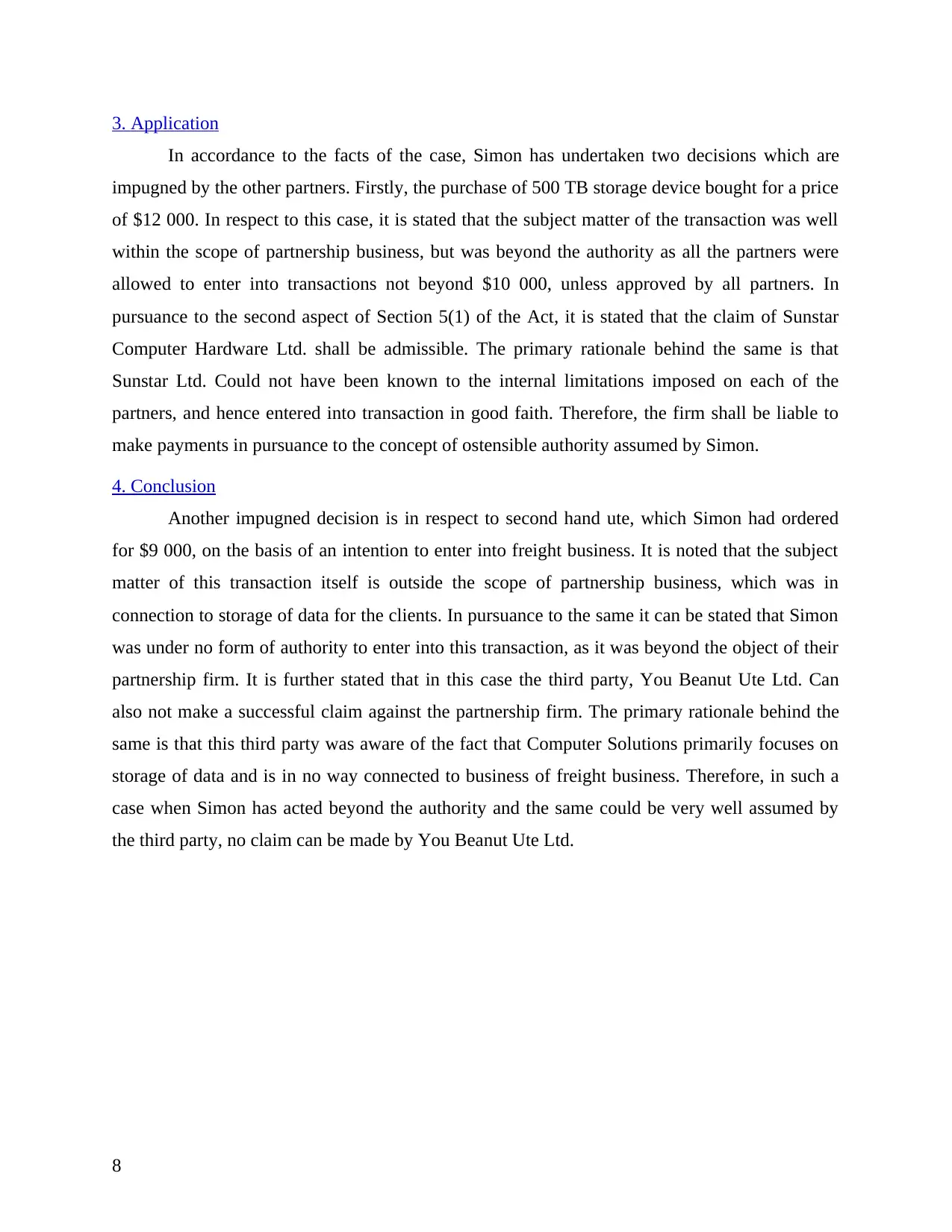
3. Application
In accordance to the facts of the case, Simon has undertaken two decisions which are
impugned by the other partners. Firstly, the purchase of 500 TB storage device bought for a price
of $12 000. In respect to this case, it is stated that the subject matter of the transaction was well
within the scope of partnership business, but was beyond the authority as all the partners were
allowed to enter into transactions not beyond $10 000, unless approved by all partners. In
pursuance to the second aspect of Section 5(1) of the Act, it is stated that the claim of Sunstar
Computer Hardware Ltd. shall be admissible. The primary rationale behind the same is that
Sunstar Ltd. Could not have been known to the internal limitations imposed on each of the
partners, and hence entered into transaction in good faith. Therefore, the firm shall be liable to
make payments in pursuance to the concept of ostensible authority assumed by Simon.
4. Conclusion
Another impugned decision is in respect to second hand ute, which Simon had ordered
for $9 000, on the basis of an intention to enter into freight business. It is noted that the subject
matter of this transaction itself is outside the scope of partnership business, which was in
connection to storage of data for the clients. In pursuance to the same it can be stated that Simon
was under no form of authority to enter into this transaction, as it was beyond the object of their
partnership firm. It is further stated that in this case the third party, You Beanut Ute Ltd. Can
also not make a successful claim against the partnership firm. The primary rationale behind the
same is that this third party was aware of the fact that Computer Solutions primarily focuses on
storage of data and is in no way connected to business of freight business. Therefore, in such a
case when Simon has acted beyond the authority and the same could be very well assumed by
the third party, no claim can be made by You Beanut Ute Ltd.
8
In accordance to the facts of the case, Simon has undertaken two decisions which are
impugned by the other partners. Firstly, the purchase of 500 TB storage device bought for a price
of $12 000. In respect to this case, it is stated that the subject matter of the transaction was well
within the scope of partnership business, but was beyond the authority as all the partners were
allowed to enter into transactions not beyond $10 000, unless approved by all partners. In
pursuance to the second aspect of Section 5(1) of the Act, it is stated that the claim of Sunstar
Computer Hardware Ltd. shall be admissible. The primary rationale behind the same is that
Sunstar Ltd. Could not have been known to the internal limitations imposed on each of the
partners, and hence entered into transaction in good faith. Therefore, the firm shall be liable to
make payments in pursuance to the concept of ostensible authority assumed by Simon.
4. Conclusion
Another impugned decision is in respect to second hand ute, which Simon had ordered
for $9 000, on the basis of an intention to enter into freight business. It is noted that the subject
matter of this transaction itself is outside the scope of partnership business, which was in
connection to storage of data for the clients. In pursuance to the same it can be stated that Simon
was under no form of authority to enter into this transaction, as it was beyond the object of their
partnership firm. It is further stated that in this case the third party, You Beanut Ute Ltd. Can
also not make a successful claim against the partnership firm. The primary rationale behind the
same is that this third party was aware of the fact that Computer Solutions primarily focuses on
storage of data and is in no way connected to business of freight business. Therefore, in such a
case when Simon has acted beyond the authority and the same could be very well assumed by
the third party, no claim can be made by You Beanut Ute Ltd.
8
1 out of 8
Related Documents
Your All-in-One AI-Powered Toolkit for Academic Success.
+13062052269
info@desklib.com
Available 24*7 on WhatsApp / Email
![[object Object]](/_next/static/media/star-bottom.7253800d.svg)
Unlock your academic potential
Copyright © 2020–2025 A2Z Services. All Rights Reserved. Developed and managed by ZUCOL.





